
Politics
16:19, 31-Jan-2018
Theresa May's visit: When 'Global Britain' meets 'Golden Era'
CGTN
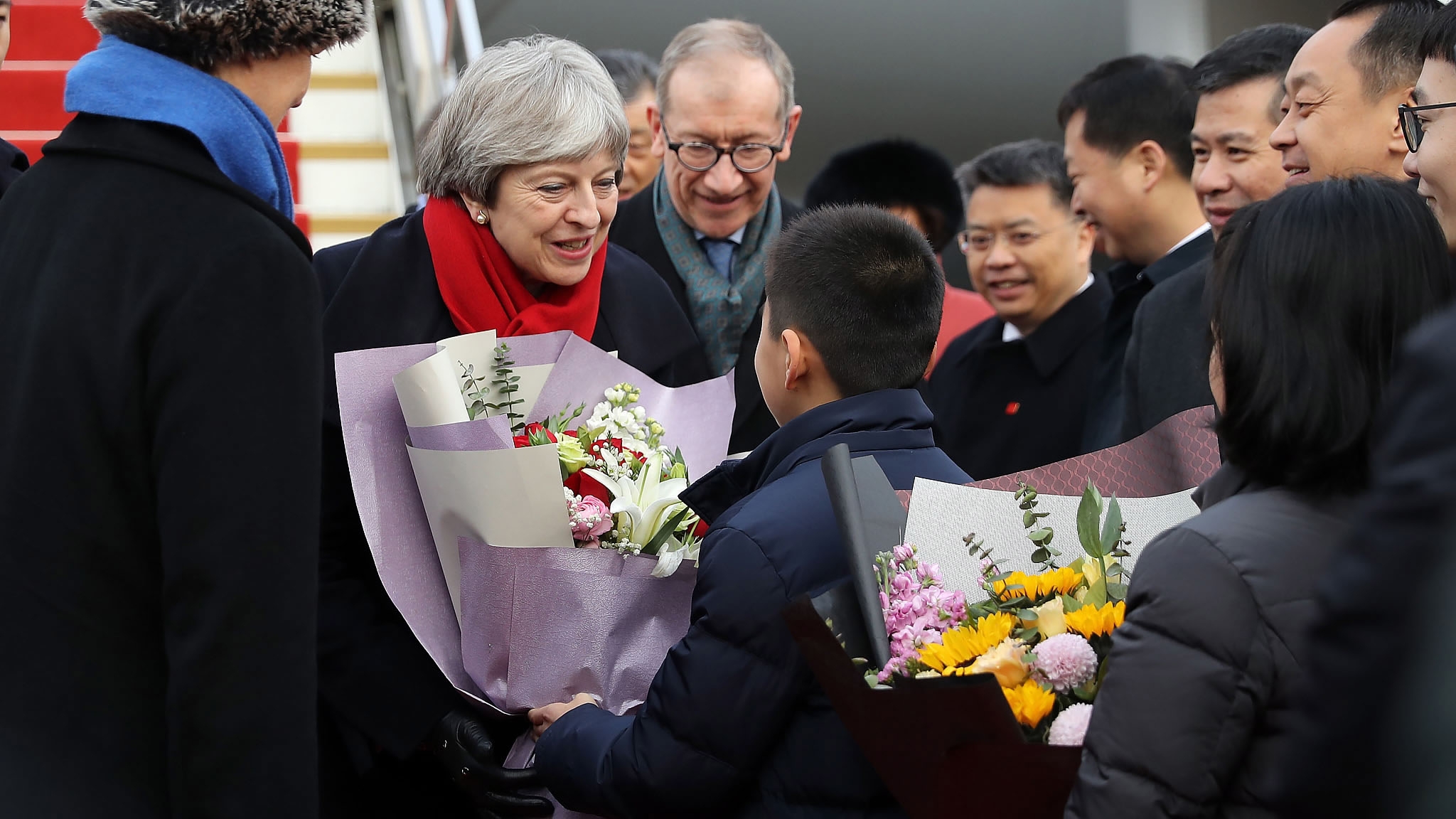
British Prime Minister Theresa May started her first official state visit to China on Wednesday, arriving with the largest business delegation she has taken overseas since assuming office.
Around 50 leaders of companies, universities and trade associations made the trip, signaling that China-UK trade and investment ties, as well as education, are the priorities for the visiting prime minister.
"China is a country that we want to do a trade deal with," May told reporters aboard her Royal Air Force jet on the way to Wuhan on Wednesday morning, adding that Britain is seeking a post-Brexit free trade agreement with China.
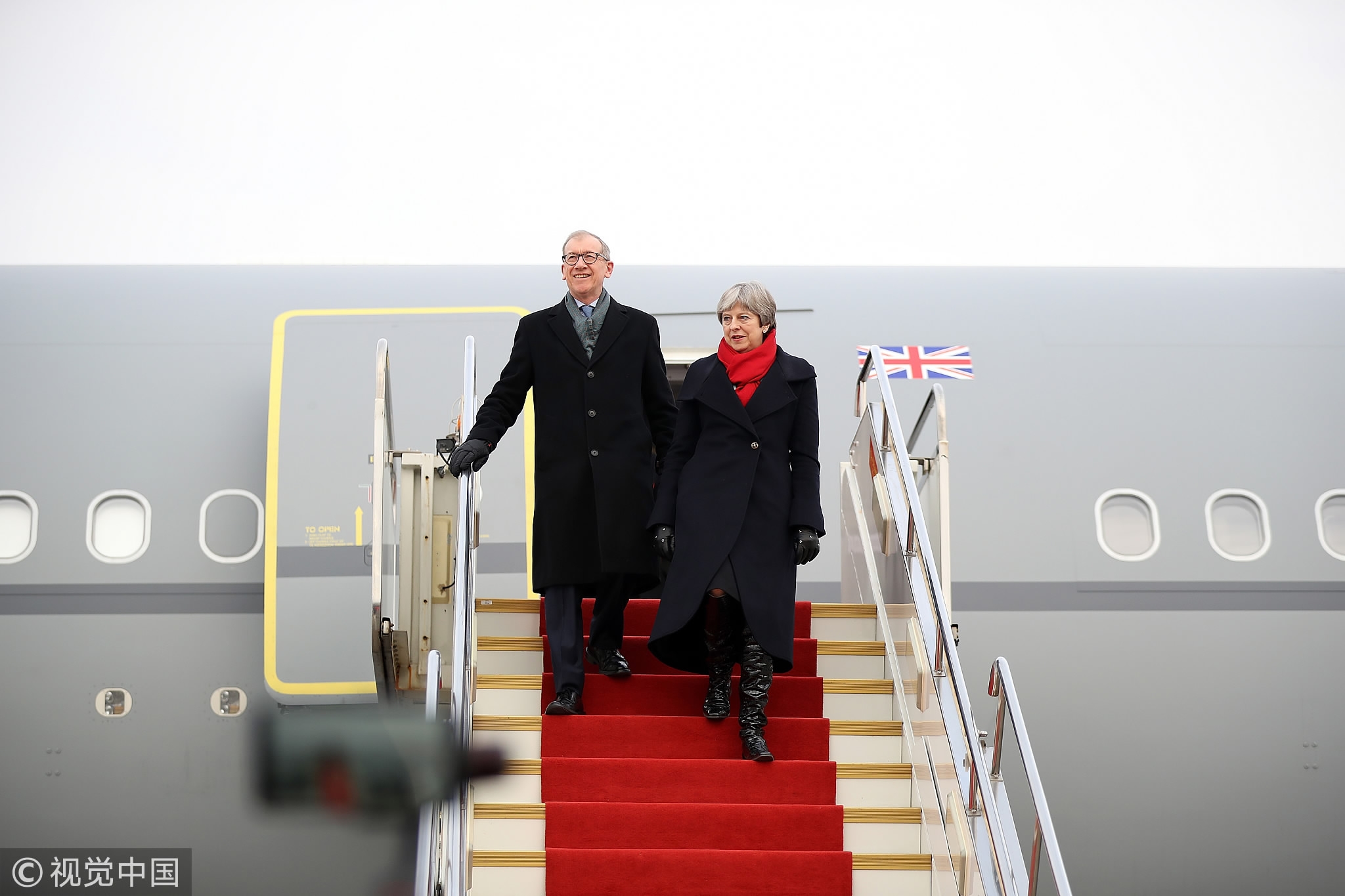
British Prime Minister Theresa May and her husband Philip arrive at Wuhan airport in Wuhan, Hubei Province, Jan. 31, 2018. /VCG Photo
British Prime Minister Theresa May and her husband Philip arrive at Wuhan airport in Wuhan, Hubei Province, Jan. 31, 2018. /VCG Photo
May is expected to announce half a billion British pounds worth of education deals in Wuhan, the first stop of her three-day visit. She will head to Beijing to meet with China's top leaders and hold a new round of the annual China-UK Prime Ministers' meeting, before traveling to Shanghai for a business forum.
With China and the UK both in the period of transition, Dame Barbara Woodward, Britain's ambassador to China, said May's visit is designed “to move towards a more ambitious trading relationship with China.”
Brexit vs China-UK trade relations
China and Britain have enjoyed robust growth in trade and investment over recent decades: Britain is now China's second largest trading partner within the European Union (EU) and China is Britain's second largest non-EU trading partner.
But May is looking to further expand that relationship.

CGTN Photo
CGTN Photo
Jeff Astle, managing director of China operations at China-Britain Business Council (CBBC), told CGTN that both countries are in a transitional period. He anticipates that trade and investment cooperation between the two countries will develop positively, with growing diversity.
"The transition now that China needs to go through with this urbanizing population and growing middle-class population is a desire for better quality life,” Astle said. “Hence, we are seeing this growth in the consumer sectors and the need to grow the services sectors."
Brexit is an area of uncertainty, Astle acknowledged, but it doesn’t change the fundamentals of the China-UK trading relationship. He added that Brexit could be a significant opportunity for both countries to become more flexible with trade deals and more diverse in investment areas.
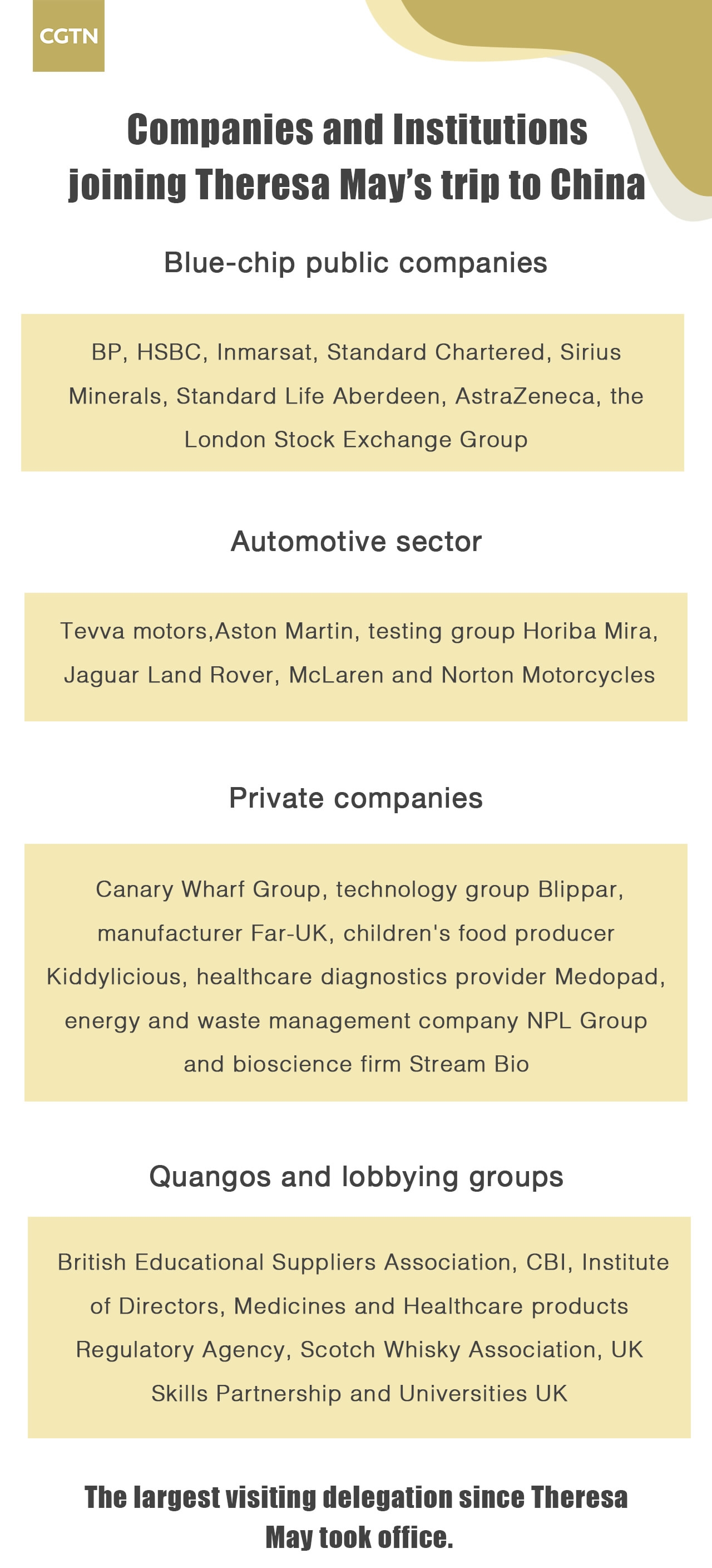
CGTN Photo
CGTN Photo
The CBBC man echoed the words of Chinese Ambassador to Britain Liu Xiaoming, who said in a recent interview: “More opportunities, especially in such areas as infrastructure, RMB internationalization, green finance and technological innovation, will emerge as a post-Brexit Britain seeks to build global partnerships while sticking to free trade and an open economy.”
Astle also highlighted another significant development: Chinese businesses’ investment overseas and global expansion. He believes London can be increasingly seen as a major center for Chinese investment overseas as it “has already been quiet proactive in positioning itself with China as a major RMB offshore investment hub.”
However, there are several challenges for May.
Zhao Chen, chief of the European Diplomacy Department of the Institute of European Studies at Chinese Academy of Social Sciences (CASS), pointed out three main concerns: first, whether British products are competitive enough to satisfy increasingly picky Chinese consumers; second, Brexit uncertainty has made Chinese investors cautious; third, the current British political situation has worried some investors.
BRI popular among British companies
Britain became the first major Western country to join the Asian Infrastructure Investment Bank as a founding member in 2015, marking a substantive step in China-UK cooperation on the Belt and Road Initiative (BRI).
At the 9th UK-China Economic and Financial Dialogue in 2017, UK Export Finance confirmed up to 25 billion British pounds' (35.3 billion US dollars) capacity to support new business in BRI countries in Asia. British bank Standard Chartered also announced its support for the BRI by committing to facilitate financing to the value of at least 20 billion US dollars by 2020.
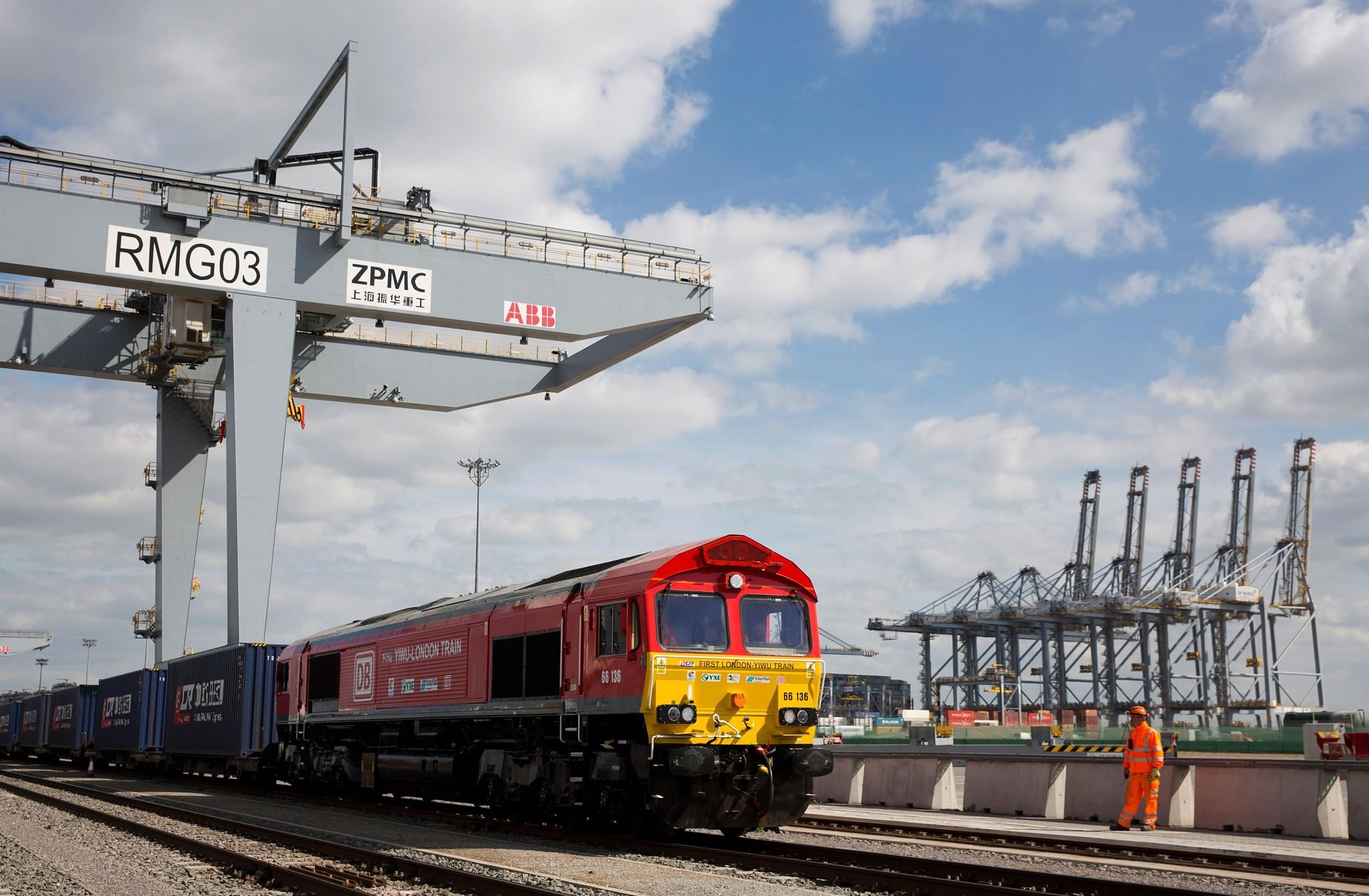
Astle confirmed the popularity of the BRI for British companies at CBBC. Positioning Britain as “a perfect partner for the Belt and Road,” he said that many British companies are increasingly interested in BRI, particularly in specialist areas like ports, shipping and logistics.
“Belt and Road is a reality, and British businesses are already working with Chinese firms in third countries,” Astle said. “It’s about how we grow that.”
Ambassador Woodward this week described Britain as a "natural partner" in BRI, outlining three areas in which Britain could contribute to the initiative: practical collaboration on projects, financial expertise such as “big four” consultancies and world’s leading law firms, and ensuring projects meet international standards.
Ambassador Liu said China and Britain should form an institutional framework under the BRI "at an early date," and May's attitude towards the project is a key point to watch during her visit.
'Golden Era' and 'Global Britain'
Ahead of May's visit, Woodward said Britain’s "commitment to the 'golden era' has remained constant, steadfast and steady."
Chinese Ambassador Liu was also optimistic, and predicted that Sino-UK ties were set to enter "golden era 2.0" as May's visit will take the bilateral relations a step further.
The term "golden era" was first used in 2015, when Chinese President Xi Jinping met with former Prime Minister David Cameron during a state visit to Britain.
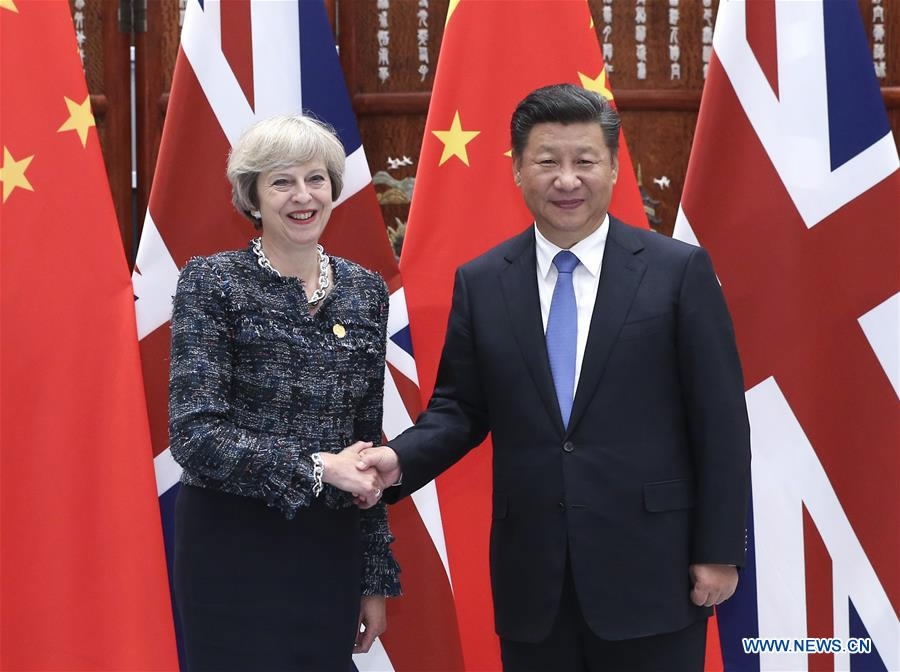
September 5, 2016: Chinese President Xi Jinping meets with British Prime Minister Theresa May in Hangzhou, capital of east China's Zhejiang Province. /Xinhua Photo
September 5, 2016: Chinese President Xi Jinping meets with British Prime Minister Theresa May in Hangzhou, capital of east China's Zhejiang Province. /Xinhua Photo
Zhao said Cameron had shown an open and proactive attitude to enhancing the vitality and competitiveness of the UK’s economy as the country recovered from the global financial crisis, and was enterprising in expanding relationships with world powers. During Xi’s 2015 visit, China and Britain agreed to build a global comprehensive strategic partnership for the 21st century.
May has had different priorities, Zhao believes. The former home secretary has put more focus on internal affairs, and has been forced to tackle the political predicament caused by the unexpected result of the Brexit referendum.
"She had more attention on national security, rather than seeking relations with major powers," Zhao said, highlighting May’s call to delay progress on the Hinkley Point C nuclear project, which has one third of investment from a Chinese company, soon after she came into office.
Bilateral relations have faced twists and turns: Liu once said that Sino-UK relations were at "a crucial historical juncture" and "mutual trust should be treasured even more" after the delay to the nuclear project.
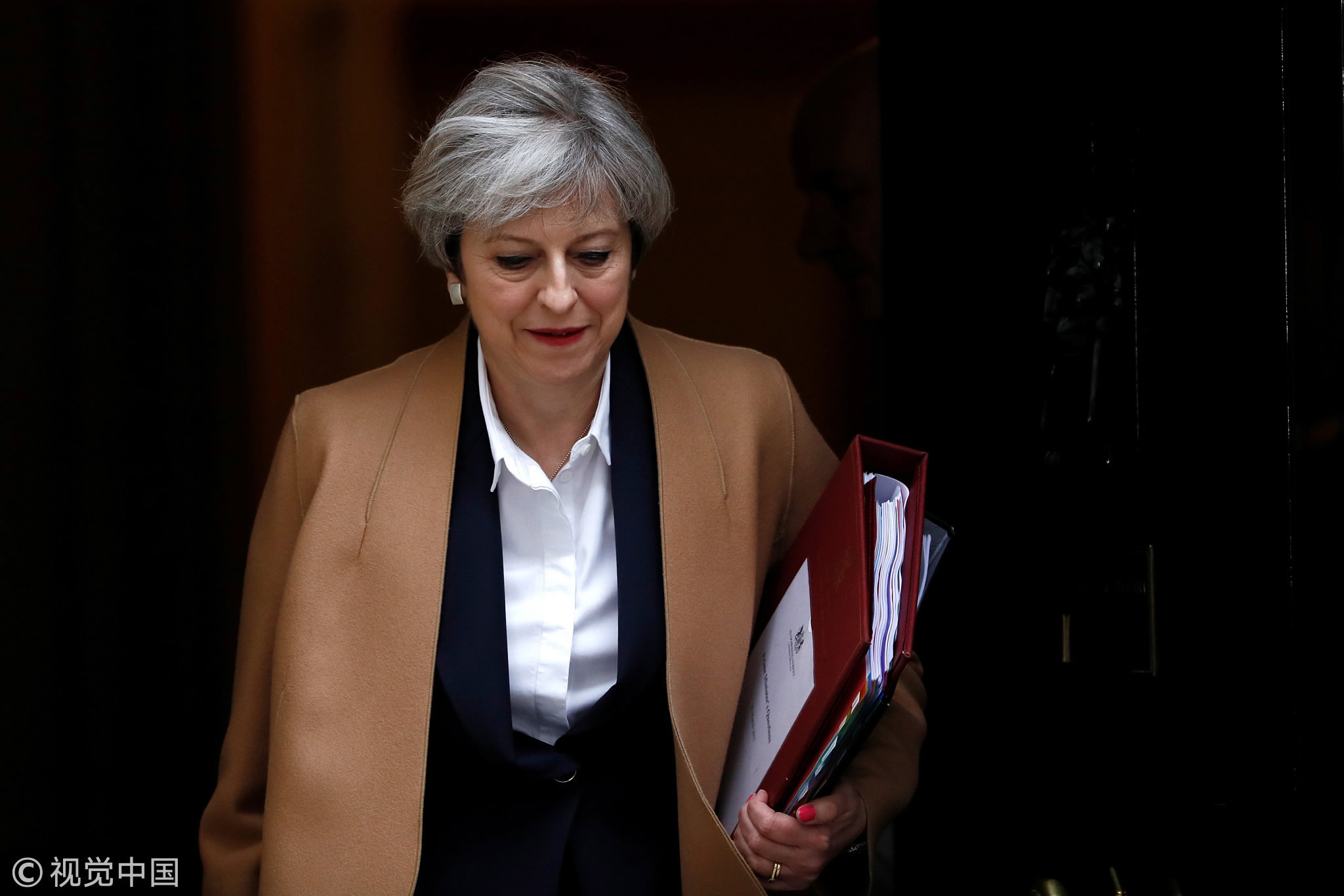
Britain's Prime Minister Theresa May leaves 10 Downing Street in London. /VCG Photo
Britain's Prime Minister Theresa May leaves 10 Downing Street in London. /VCG Photo
However, as the UK is leaving the EU, the country is determined to strike trade deals with major world powers, part of a post-Brexit vision May calls “Global Britain.”
"The UK has to treat China, the US and other world powers in a more equal way, as it treats EU. Thus the trade and investment relationship with other countries outside EU will become as important as with EU," Zhao said.
May reiterated the UK's willingness to stick with the “golden era” and to further strengthen bilateral relations when she met with President Xi in Hangzhou and Germany during the G20 summits in 2016 and 2017 respectively.
May will gild the "golden era" and enrich China-UK relations, Zhao predicted, adding that China-UK relations would be further strengthened in terms of trade and investment.
“As China's economy rebalances while Britain's economy moves into a new phase post Brexit, China and the UK need to build on that 'golden era' of a very strong political relationships," Astle said, adding that the two sides should try to find new ways to develop trading and investment relationships that match their ambitions.

SITEMAP
Copyright © 2018 CGTN. Beijing ICP prepared NO.16065310-3
Copyright © 2018 CGTN. Beijing ICP prepared NO.16065310-3